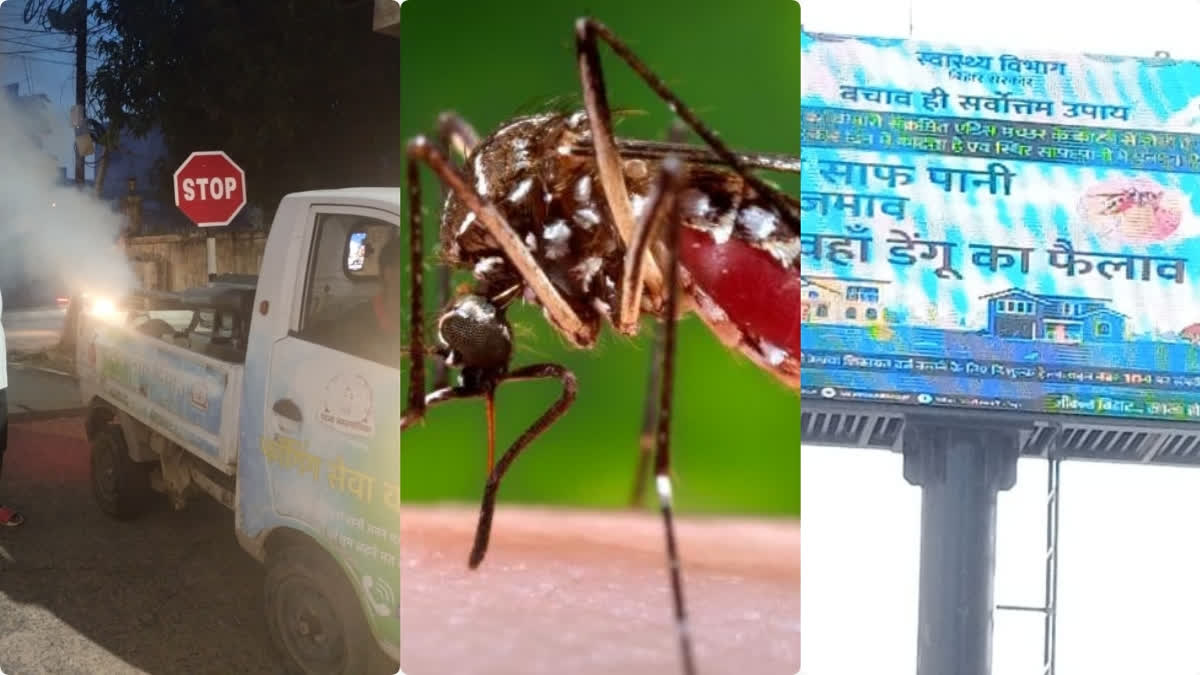Patna(Bihar): As the dengue fever outbreak tightens its grip on Bihar, the state has reported a staggering 134 new cases on Sunday, according to the latest update from the health department. The capital city, Patna, is bearing the major brunt with 36 of these new cases, pushing the overall tally of dengue patients in Bihar to a worrisome 700, with Patna alone grappling with 298 confirmed cases.
The escalating situation has prompted hospitals in Patna to take emergency measures to accommodate the surge in dengue patients. Patna Medical College and Hospital (PMCH) has taken proactive steps by allocating 34 beds exclusively for dengue patients. Among these, 24 beds have been designated for adults in the Tata ward, while 10 beds are reserved for affected children. Several areas within the capital city, including Patliputra, Bankipur, Kankarbagh, Patna City, Phulwarisharif, Kumhrar, and Shastri Nagar, have emerged as hotspots for dengue transmission.
To combat the alarming rise in dengue cases, municipal authorities have joined forces with healthcare officials to launch extensive awareness campaigns across the city. Teams of dedicated doctors deployed by the Municipal Corporation are visiting various neighborhoods to educate residents about dengue prevention measures.
Bhagalpur, the second-most affected district in Bihar, has witnessed a surge in dengue cases, with an additional 19 new infections reported on Sunday alone. The primary healthcare facility in the area, Mayaganj Hospital, is currently grappling with an overwhelming influx of dengue patients.
Emergency Measures to Tackle Dengue Crisis
In response to the growing dengue crisis, authorities have taken several emergency measures to ensure the availability of essential medical resources. Platelets, a critical component for dengue treatment, are now accessible in two shifts at the Indira Gandhi Institute of Medical Sciences (IGIMS) blood bank in Patna. This move aims to make platelets available to the public between 8:00 AM and 8:00 PM. Additionally, PMCH's blood bank has a stock of 72 units of platelets, while the Red Cross holds 9 units, Prathama Blood Bank has 25 units, and Maa Blood Centre has 24 units.
Helplines and Information Dissemination
To facilitate communication and provide support to those affected by dengue, the State Health Committee has set up 104 call centres and control rooms in Patna. Simultaneously, the Municipal Corporation is leveraging Smart City's Variable Messaging Display, DMD, and PS systems to disseminate information and raise awareness about dengue prevention. For the convenience of patients and concerned citizens, dedicated helpline numbers, including 0612-2370131, 0612-2951964, and WhatsApp number 7739851777, have been made readily available.
Medical Expert's Insights: Manoj Kumar Sinha, the Head of New Gardiner Road Hospital in Patna, emphasized the gravity of the situation, stating, "The cases of dengue have not seen a significant drop in platelet counts. However, patients with platelet counts nearing 20,000 require platelet transfusions. Others can expect recovery through outpatient department (OPD) medicines." Sinha encouraged people to take personal preventive measures, including maintaining cleanliness, consuming fresh food, and staying well-hydrated, not only to combat dengue but also to address the increasing cases of viral fever, which are a concern during changing weather conditions.
Preventive Measures Crucial in the Battle Against Dengue: Sinha reiterated the importance of preventive measures, highlighting the following key practices to reduce exposure to dengue:
Eliminating Stagnant Water Sources: Stagnant water serves as a breeding ground for dengue mosquitoes. Eliminating these sources can significantly reduce the risk of dengue transmission.
Maintaining Clean Utensils and Pots: Clean containers prevent the accumulation of water, which can attract mosquitoes.
Using Mosquito Nets: Sleeping under mosquito nets provides protection against mosquito bites, especially during the night.
Wearing Full-Sleeved Clothing: Covering exposed skin with full-sleeved clothing helps prevent mosquito bites.
Staying Well-Hydrated: Adequate hydration supports the body's immune system and aids in recovery from dengue.
Consuming Fresh Fruits: A balanced diet rich in fresh fruits and vegetables boosts overall immunity.
Avoiding Street Food During the Rainy Season: Street food can be a potential source of contamination, so it's advisable to opt for home-cooked meals during this period.
As Bihar grapples with the dengue outbreak, concerted efforts from healthcare authorities, government agencies, and citizens are crucial in curbing the spread of the disease and ensuring the well-being of the affected population. Public awareness and adherence to preventive measures will play a pivotal role in mitigating the dengue crisis and safeguarding the health of Bihar's residents.
Also read: Dengue cases increase in Karnataka: 6,806 cases detected, more in Bengaluru



